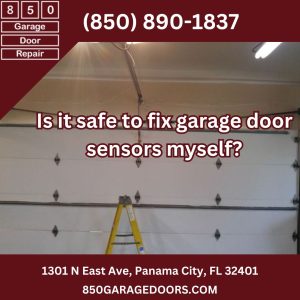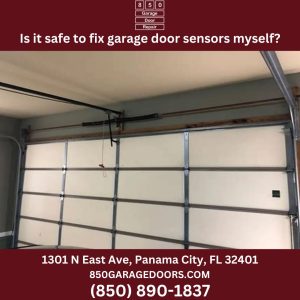Understanding How Garage Door Sensors Work
What Are Garage Door Sensors?
Garage door sensors are safety components installed near the base of the door, typically a few inches above the ground. Their main purpose is to prevent the door from closing if there’s an obstruction in its path. They play a vital role in keeping people, pets, and belongings safe by detecting movement or objects under the door.
How Do They Work?
Most modern garage doors use infrared sensor technology. A pair of sensors is placed on either side of the garage door’s lower tracks. One sensor emits an invisible beam while the other receives it. When something blocks this beam, the signal is interrupted, prompting the door to stop closing and reverse direction. This system helps prevent accidents and damage to both the door and anything underneath it.
Common Garage Door Sensor Problems
Misaligned Sensors
If one or both sensors become misaligned, the door might not close properly. A common sign of misalignment is a blinking light on one or both sensors. This issue often occurs when the sensors are accidentally bumped or knocked out of place during daily activities such as moving lawn equipment or bicycles.
Dirty or Blocked Lenses
Dust, dirt, and cobwebs can easily collect on sensor lenses, disrupting the infrared beam. A soft cloth and mild cleaner are usually enough to remove buildup. Regular cleaning ensures consistent performance, especially in humid Florida conditions where debris and moisture are common.
Wiring or Power Issues
Loose, damaged, or frayed wiring can interrupt the power supply to your sensors. This is a more serious issue that typically requires professional attention because it involves electrical connections. Faulty wiring can also cause inconsistent behavior, such as the door reversing randomly or failing to respond.
Damaged Sensor Housing
Physical impact or water exposure can damage the sensor housing. In coastal Florida areas, humidity and salt air can also lead to corrosion over time. Cracked or water-damaged sensors may not align properly, even after adjustments, making replacement necessary.
Can You Fix Garage Door Sensors Yourself?
Simple Fixes You Can Try Safely
- Clean the lenses with a soft cloth
- Check for visible obstructions or debris
- Ensure the sensors are properly aligned
- Tighten loose mounting brackets
- Make sure the sensors are securely plugged in
These basic maintenance steps are generally safe for homeowners and can solve minor issues without professional assistance. However, if the problem persists after trying these adjustments, more serious underlying issues may be present.
When DIY Becomes Dangerous
Not all garage door sensor problems are safe to handle without expertise. Replacing wires, opening electrical components, or working near the moving parts of the door can lead to injury. The door’s spring and motor systems are under high tension and require special tools and training to handle safely. Attempting to fix these parts without experience can cause severe harm or damage to the door.
Safety Risks of DIY Garage Door Sensor Repair
Electrical Hazards
Garage door sensors rely on electrical connections, and improper handling can result in electric shock. Even low-voltage systems can be risky if wires are exposed or improperly connected. In humid climates, like Florida, moisture increases the risk of short circuits or corrosion when components are not sealed correctly.
Door Malfunction or Injury Risk
If sensors are not correctly installed or calibrated, the door may close unexpectedly. A malfunctioning door can cause injury or property damage, especially if someone or something is in its path. This is one reason why safety testing and precise calibration are critical after any sensor repair.
Voiding Warranties
Many manufacturers void warranties if the sensors are tampered with by anyone other than a certified technician. DIY repairs that alter the wiring or structure of the system can leave homeowners responsible for future damages or system failures that would otherwise have been covered.
When to Call a Professional
Persistent Malfunctions
If the door continues to malfunction after cleaning and realigning the sensors, a deeper electrical or mechanical problem may exist. A professional can test the circuitry, replace damaged parts, and ensure the entire system is calibrated to operate safely.
Wiring or Power Problems
When the issue involves wiring or power flow, it’s always best to call a qualified garage door technician. Professionals have the right tools and diagnostic equipment to handle electrical systems safely and prevent further damage.
Full System Inspection
Sometimes, what appears to be a sensor issue is actually related to the opener or track system. A complete inspection helps identify worn parts, faulty circuits, or misalignments throughout the entire mechanism. Regular maintenance from a trained technician helps extend the life of your garage door system and ensures consistent performance.
Comparison Between DIY and Professional Garage Door Sensor Repair
| DIY Garage Door Sensor Fix | Professional Repair Service |
|---|---|
| Limited to basic cleaning and alignment tasks | Includes full diagnostic and safe electrical testing |
| May cause further damage if done incorrectly | Ensures correct calibration and safety compliance |
| No warranty protection for improper work | Maintains warranty coverage and professional accountability |
| Potential for personal injury or malfunction | Handled by trained experts with proper tools |
| Can resolve only surface-level problems | Addresses root causes and prevents future issues |
Final Thoughts
Safety Comes First
Minor cleaning and sensor alignment are safe for most homeowners to handle. However, once electrical wiring or mechanical adjustments are involved, it’s best to leave the job to professionals. Knowing when to stop and call an expert protects both you and your garage door system. A malfunctioning safety sensor is not something to take lightly, especially when it guards against potential accidents.
Conclusion
While it may seem convenient to fix garage door sensors on your own, the risks often outweigh the benefits. Basic maintenance is fine, but complex repairs should be handled by an expert who understands the system thoroughly. Properly functioning sensors protect your family and your property every day. For safe and reliable garage door repair services, homeowners can rely on the experienced team at 850 Garage Doors. To learn more, visit https://www.850garagedoors.com/ and explore professional solutions that keep your garage door operating safely and smoothly.



